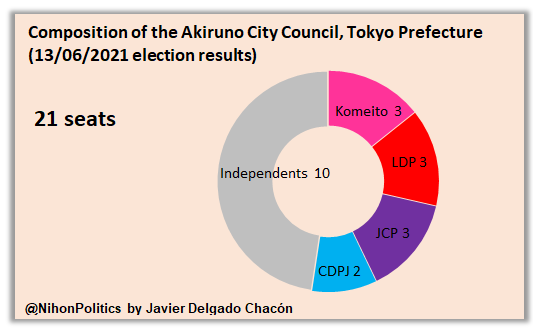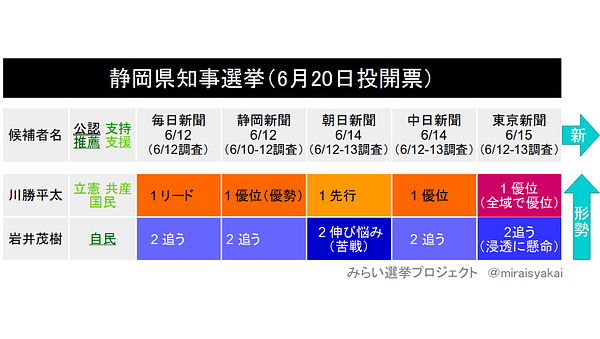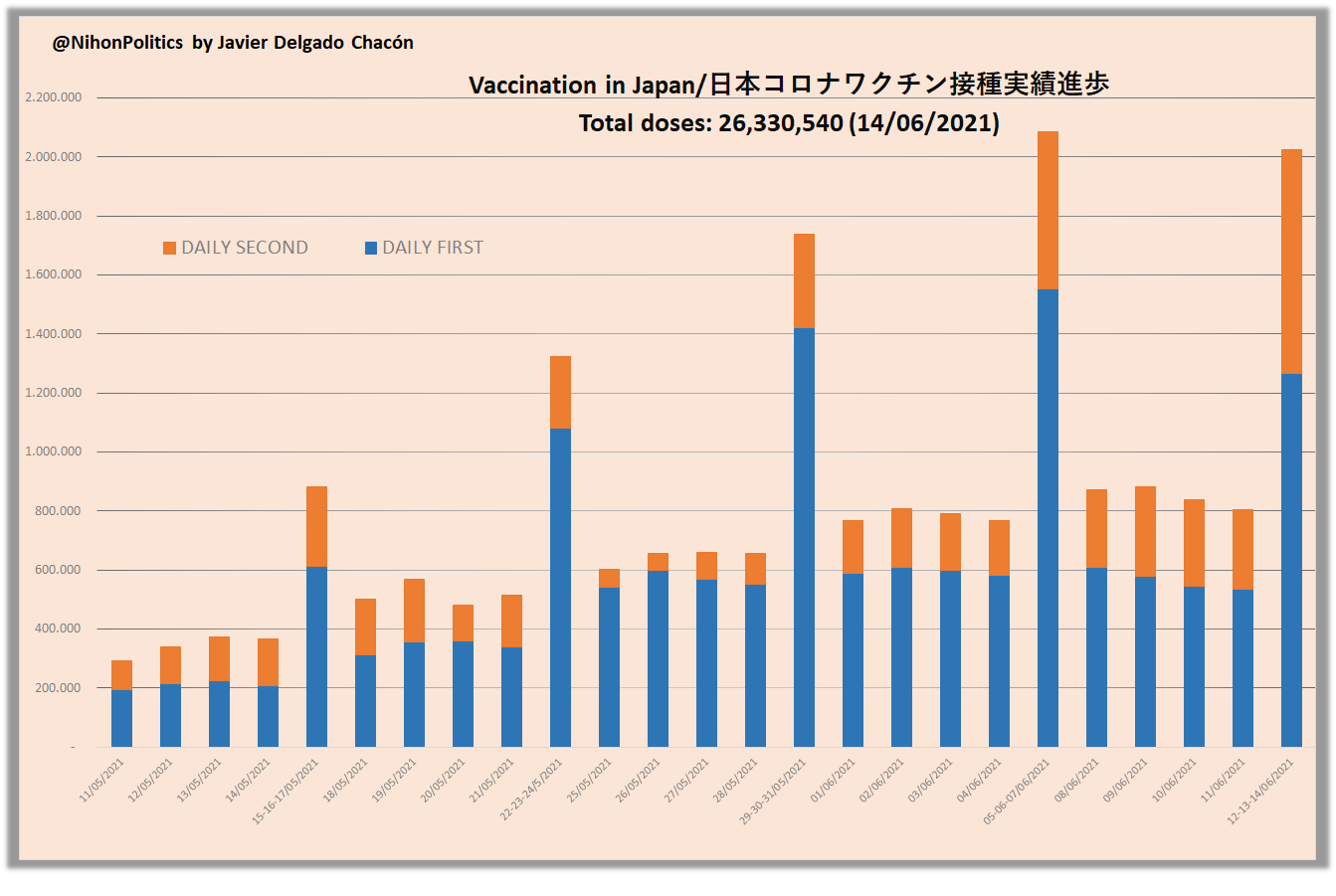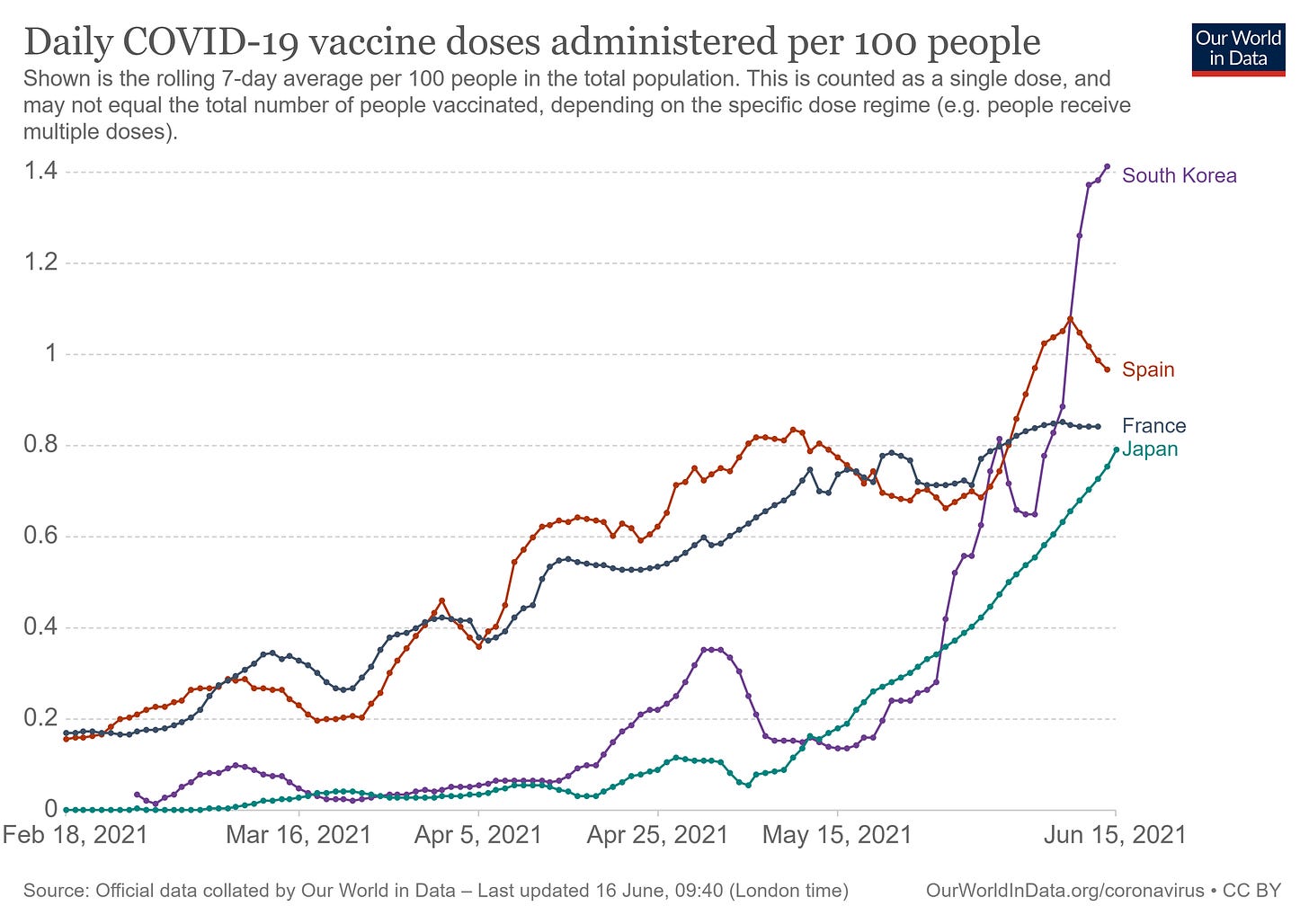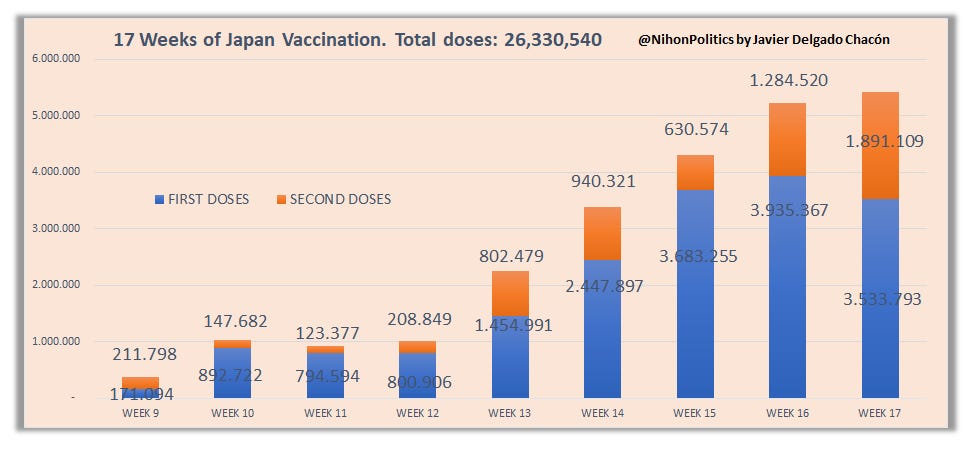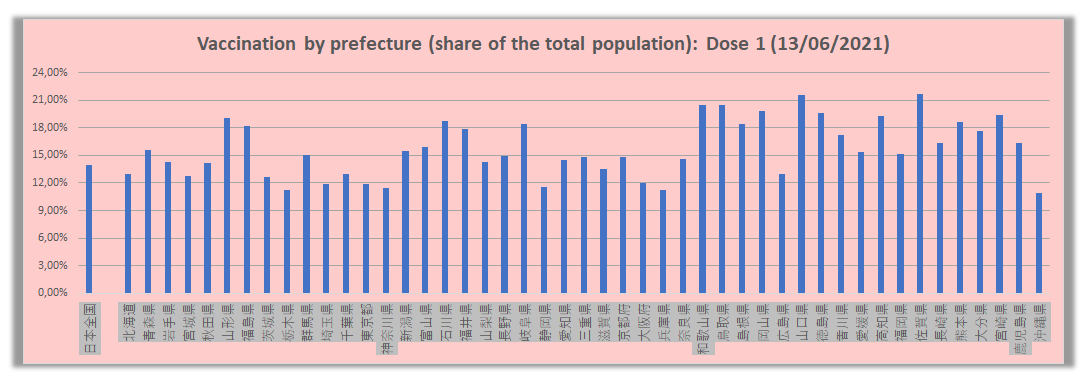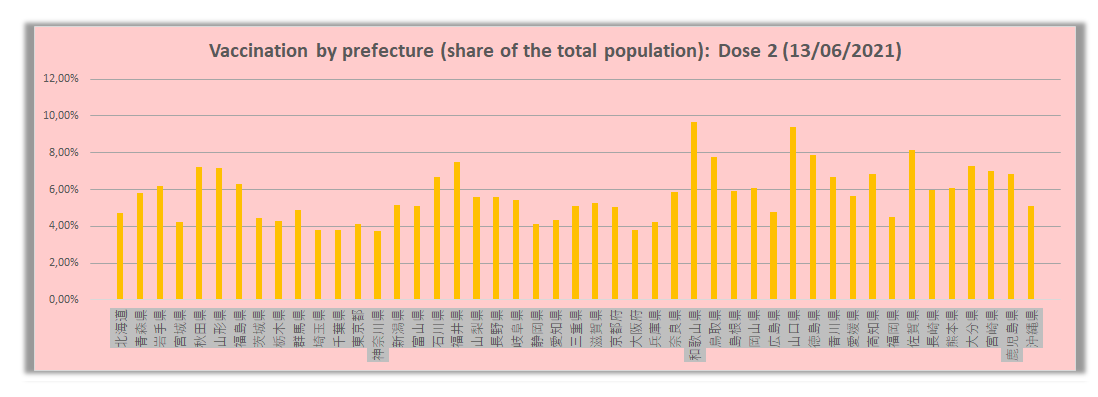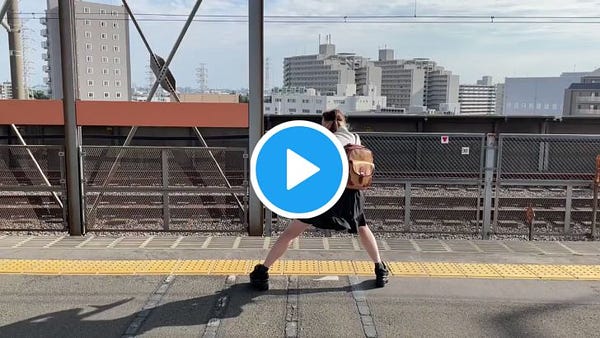Suga Survives his First Motion of No Confidence as PM
A Controverial Land Use Law is Approved & the Race for Shizuoka Governor Heats Up
Hello everyone. Thank you for reading.
I’m coming today with a shorter, but equally relevant, version of the newsletter, as I’m especially busy this week.
If you like the work I do here on Subtack and also on Twitter at @Nihonpolitics, I welcome any contribution at:
I’ve received already support from some of you and I am really thankful😊😇
Now, Let’s go:
Election News🗳️
The Essentials: News and weekly politics about Japan.🏆
Progress on the Vaccination Process of Japan💉
Tweet(s) of the Week💬
Election News🗳️
I’m already working on the piece about the Tokyo Metropolitan Assembly Election on the fourth of July. Last weekend, we had a last preview of the race with an election in a city to the west of Tokyo that could give us some insight about it:
Akiruno City Council Election (Tokyo)
On Sunday, a new election for the city council of Akiruno City (あきる野市) took place. A rural community of 80k at the edge of western Tokyo, Akiruno will be a battleground in the next Metropolitan Assembly Election, and if the city council results mean anything, the race should be competitive.
Formed by 21 seats, these were the results in the city council election, which had a turnout of 50%, two points below the previous race:
A plurality of those elected were independents, followed by Komeito, the LDP and the JCP with 3 seats each. Even though only three candidates were elected official LDP members, a lot of the independents do caucus with the party in the city council.
The CDPJ retained its seats and fell short of winning the third one by a few hundred votes.
As Maeda Nao from Asahi says (go follow him), every party except the CDPJ lost votes in comparison to the previous election. The fall was especially alarming for Komeito, which lost over 800 votes. Has the pandemic damaged the outreach operations of Komeito? Could the party be in danger in the election for the Tokyo Assembly? Hmmm…

The Essentials: News and weekly politics about Japan 🏆
The Diet Rejects A Motion of No Confidence Against PM Suga 🗾
After weeks of back and forth, the Constitutional democratic Parties and three other opposition parties decided on Monday to present a Motion of No Confidence against the government of Prime minister Suga. Until it came to be, the LDP and its Secretary-General Nikai Toshihiro had warned them strongly against doing it: he threatened with calling a snap election. However, two days ago, the Opposition called his bluff. The Motion of No Confidence was presented and the Prime Minister is not expected to call for an election…



On Tuesday, the Lower House of the Diet rejected, as expected, the Motion of No Confidence:

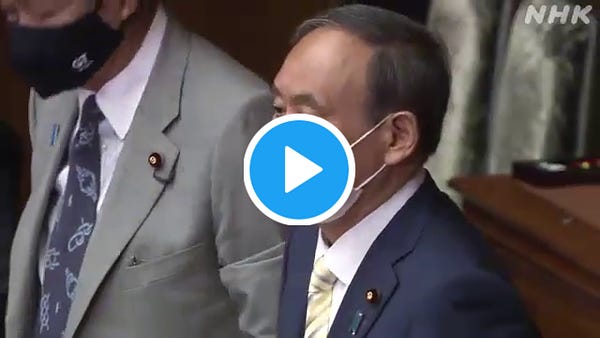
The final tally was:
Votes in Favor: 134
Votes Against: 322
In the last years, since Shinzo Abe came back to the role of Prime Minister in 2012, these motions had become almost a yearly ritual for the Opposition parties1. Always ineffectual, they ended up in failure but the Opposition liked to show its opposition to Abe using this constitutional provision.
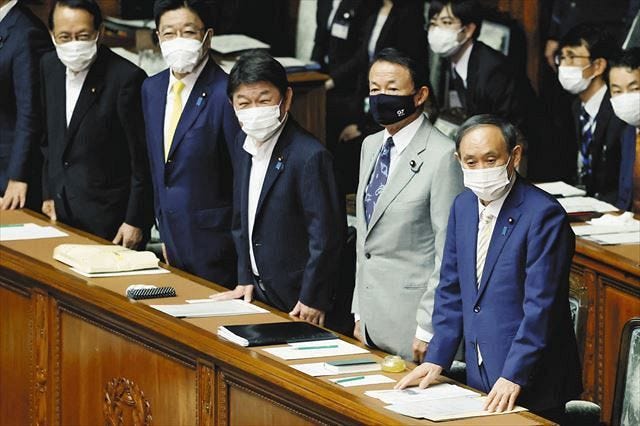
This year, in 2021, Yukio Edano, the leader of the CDPJ, used the handling of the pandemic in Japan as a motivation to rally the Opposition parties, including the Japanese Communist Party, the Democratic Party for the People, the Social Democratic Party of Japan and even Reiwa Shinsengumi, into forming a common position in favor of the No-Confidence Motion. From the start, they knew it would up in failure but it didn’t discourage them from doing it. Why? Because it was the starting gunshot of intense six months in Japanese politics:
With the presentation of the motion, the five parties showed unity in confronting the government of Prime Minister Suga.
Even though it may not bring direct consequences in only a few days, it shows the intention of all of them of fighting together「野党共闘」, as much as possible, in the next general election in the fall. We don’t know to what extent that’s feasible however for July’s election for the Tokyo Assembly. 🤔
In that party cooperation, Reiwa is essential. In his speech to the Diet before the roll-call vote, CDPJ leader Edano mentioned a “time-limited reduction of the consumption tax to 5%” an economic measure that has become a requirement of Yamamoto Taro’s party to participate in the coordination of candidates in the election, despite the reticence still shown by the CDPJ.
To this point, cooperation and coordination is giving results, at least, in the configuration of candidates in districts all over Japan. That alone can be considered a meaningful step, I think.


In this sense, make sure to read this article by Hirakawa Eri (@yomu_kokkai) on the difficulties of the Opposition in coordinating. It’s really great.

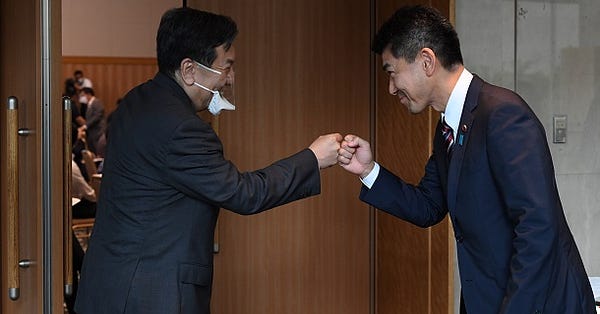
The Upper House of the Diet Gives Final Approval to Controversial Land Use Bill 🛦👮
After a contentious2 debate on the Upper House of the Diet that extended well into the night, the floor of the House of Councillors greenlighted on Tuesday the controversial “Law on the Regulation of the Use of Relevant Land”「重要土地利用規制法案」.
The bill, which had previously been approved in the Lower House, regulates the use of land located around: a) military bases and b) outlying islands, giving the government new capacity to investigate private citizens, in order to fulfill its responsibilities of defense of the country「安全保障 」, is it argued.
This law gives the Japanese government capabilities to search and investigate the land existing around the previously mentioned two cases, including its owners and any other data they might deem relevant, like the nationality of the owners. In fact, the mere existence of these military bases gives the government the right to know information even about possible buyers of land in 1 kilometer around it, if the base is named to be of “special relevance”「特別注視区域」. The government has argued that it is necessary to know the data of present or future owners of land so closely located to critical infrastructure like military bases, foreign and domestic or nuclear power plants, for instance. The approved bill also allows to government to impose penalties on the owners of this land if it interferes, or hindrances, the development and well-functioning of the infrastructure (mainly electronically)
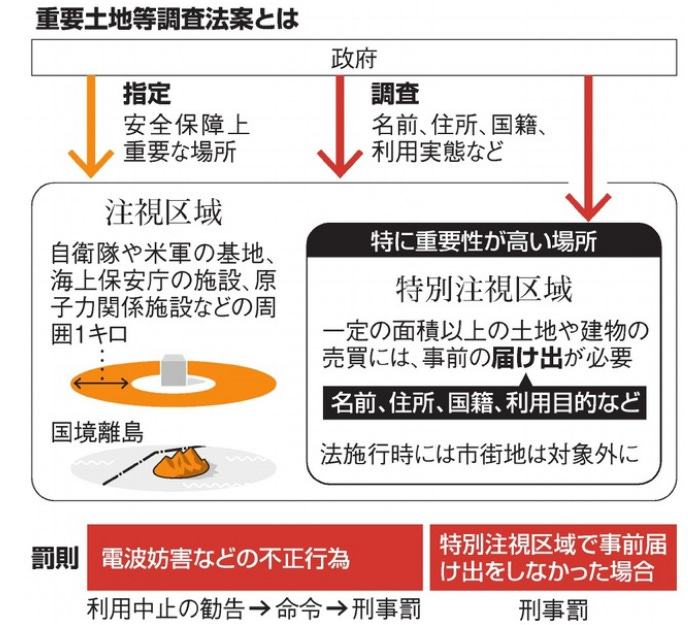
The opponents of the law in the parliament, the CDPJ and the Japanese Communist Pary, strenuously rejected the proposal, alleging that the law gives too much power to the government without sensible oversight vested in the Diet.
They also warned against intrusive and vague3 searches on the information of private citizens by the government4, a sensitive topic in Japan.
In the end, the bill was passed with the support of the LDP, Komeito, Ishin no Kai and the Democratic Party for the People.
The Race for Governor of Shizuoka enters the Final Stretch 🚄
With just four days left in the race for Governor of Shizuoka, the LDP braces for what could be another loss in a high-stakes election, after the tripled defeat of last April.
The latest polls published in the last week show a very convincing lead for the incumbent, Kawakatsu Heita over the conservative candidate Iwai Shigeki. In fact, they point to a victory for Governor Kawakatsu and the Opposition parties that support him, close to a landslide, in a prefecture where the LDP has been historically strong.
Check out the results in Shizuoka from the last national election that took place in2019:
The LDP won close to 40% of the vote.
The CDPJ was comparatively weaker, caused by the remnants of the old Party of Hope that triumphed here in 2017. Its remaining strength allowed the DPFP to win close to 13% of the vote. I doubt they can maintain that level of support in the next election, after the party partially merged with the CDPJ in 2020, though...
The presence of a popular incumbent against an unpopular national government probably plays against Iwai Shigeki, who has been representing Shizuoka in the Upper House since 2001 (in both elections he won, he was the top vote-getter).
On the tourism/business travel/student front, there is wonderful news. Thanks to the vaccination, things are moving in the right direction. Tourism might come back sooner than expected, probably, after vaccine passports help to restart business travel and student exchanges!! 👏👏




Progress on the Vaccination Process in Japan💉
Slowly but with a secure footing, Japan continues advancing in its vaccination process, increasing the daily rate of vaccination. Every day of last week, Japan managed to administer more than 800k doses! By early July, it should get to the government’s goal of 1 million days, which will give a fundamental boost to the vaccination process👏
Such a nice chart to see. Japan is just a week, or two, away from vaccinating 1% of its population daily.🚀🚀
Japan keeps breaking weekly records, with two weeks in a row administering more than 5 million doses. Last week though, there was a little dropoff in the number of the first dose in comparison to the growth in second doses which is being directed towards the last healthcare workers, and the first vaccinated seniors.
I think the capacity is there to continue growing beyond 5 million doses per week, once the vaccination is opened to: a) those below 65, b) workplaces, c) and universities.
Week after week, we continue with the climb of doses administered throughout Japan. As expected, the prefectures with a smaller and aging population have a higher share of them vaccinated.
We find 4 prefectures with more than 20% of their total population partially vaccinated:
Saga 21.6%
Yamaguchi 21.6%
Wakayama 20.5%
Tottori 20.4%
On the other end of the list, some urban areas of Japan still don’t reach even 12% of their population with one dose, at least:
Saitama 11.8%
Kanagawa 11.5%
Shizuoka 11.5%
Osaka 11.9%
Hyogo 11.3%
Tochigi 11.2%
Okinawa 10.9%
The administration of second doses moves at a slower pace, obviously. Nevertheless, five prefectures are out front with a range of 8% and 10% o their population already completely vaccinated.
Wakayama 9.7%
Yamaguchi 9.4%
Saga 8.1%
Given that the vaccination is focused now on the elderly, those prefectures with an aged population are at a more advanced stage, with close to 50% of the senior citizens vaccinated at least with one dose. Check it out here:


Tweet(s) of the Week💬
Go get your vaccine!


爆笑

Japanese Food Twiter always excels at it.
Yes. It is jaw-dropping.

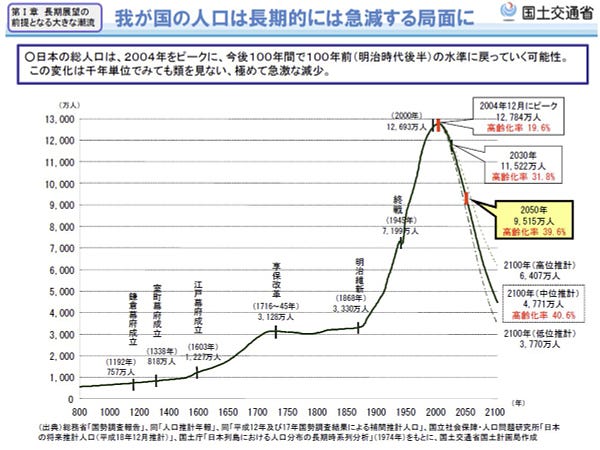
Thank you so much for reading the NIHONPOLITICS newsletter again.
Don’t forget to SING UP to receive the newsletter each thursday in your inbox. And you can follow me on Twitter too at @Nihonpolitics
😀😀
You can read the previous entry here:

During the government of PM Abe, the Opposition presented 9 different Motions of No Confidence against him (in his two stints as PM). All of them failed.
During the session, the Opposition parties tried to dismiss two Diet committee chairmen: LDP Mizuou Toshiei「水落敏栄」Chairman from the Rules Committee & LDP Mori Hiroshi「森屋宏」Chairman from the Cabinet Committee. Both attempts failed.
As the Tokyo Shinbun points out in the article I provided, the government doens’t make clear in the law if it applies, for example, to the headquarters of the Japanese Self-Defense Forces in Ichigaya, Tokyo 「防衛省市ヶ谷地区」 at the center of the city.
The bill does not make clear either if the Self-Defense Forces themselves could carry out these investigations.





